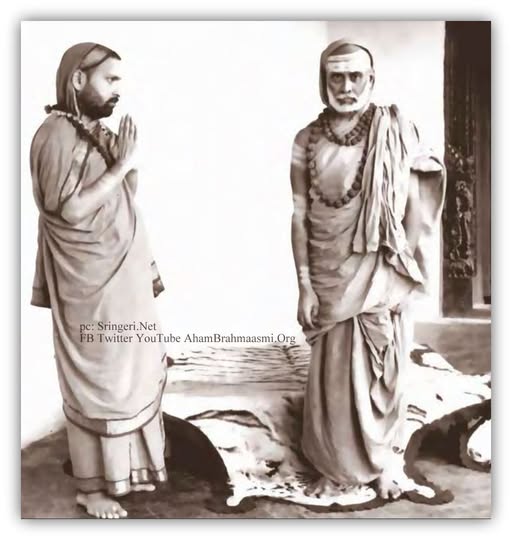24/05/2025
𝐀 𝐌𝐮𝐬𝐭 𝐑𝐞𝐚𝐝 𝐚𝐧𝐬𝐰𝐞𝐫 𝐛𝐲 𝐭𝐡𝐞 𝐑𝐞𝐚𝐥𝐢𝐳𝐞𝐝 𝐌𝐚𝐬𝐭𝐞𝐫 𝐉𝐚𝐠𝐚𝐝𝐠𝐮𝐫𝐮 𝐒𝐫𝐢 𝐒𝐫𝐢 𝐂𝐡𝐚𝐧𝐝𝐫𝐚𝐬𝐡𝐞𝐤𝐚𝐫𝐚 𝐁𝐡𝐚𝐫𝐚𝐭𝐢 𝐌𝐚𝐡𝐚𝐬𝐰𝐚𝐦𝐢𝐣𝐢
Another evening, the conversation which was quite general at first, gradually turned on to the subject of bhajana, singing of devotional songs to the accompaniment of music. A bhakta who belonged to the party in attendance mentioned that such devotional exercises had an exhilarating and soothing effect on our wayward minds and that it was pleasing to find that bhajana parties were being formed in increasing numbers in every town and village.
Devotee: Surely a person who spends his time in prayer and contemplation of the Lord is as much a bhakta as, if not more, the one who busies himself with outward rituals.
HH: Leave alone comparing. He will not be a bhakta at all if he chooses to neglect the karma enjoined on him in favour of mental prayers and contemplation.
D: Why so?
HH: Take the ordinary case of a master and his servants. Suppose one of his servants is always standing before him and singing his praises. The master may sometimes ask him to fetch something from another room. Suppose the servant replies, ‘O, Master, I cannot bear the thought of parting from you even for a moment. I cannot forego even for a moment the pleasure and the privilege of looking at your handsome face. I like to be ever with you and to praise you by recounting your inestimable qualities. Don’t ask me to leave your presence.’ Suppose again there is another servant who is always away from the presence of the master, but is carrying out with scrupulous care all the commands of the master, communicated to him either by the master personally or through his deputies. Wherever the master turns, he finds that he has been most loyally obeyed by this servant who nowhere seems to intrude on him. Which do you think is the more devoted of these two servants and with whom in your opinion, will the master be pleased more?
D: Certainly the latter.
HH: Is a father happy with the child who always prefers to sit on his lap and declines to do anything or with the one who is going out on errands?
D: With the latter, I should think.
HH: Further, can you grant that the servant, or the boy, who refuses to leave the presence of his master or father and does not carry out his orders, is really devoted at all?
D: Surely disobedience cannot go hand in hand with devotion.
HH: Quite so. The primary test of devotion in any sphere of life is obedience, unquestioning and loving obedience, not inquisitive or grumbling obedience.
D: Certainly.
HH: ‘The Sruti and the Smriti are the commands of Myself,’ says the Lord. Can you conceive of a devotion to the Lord side by side with a disobedience of His commands?
D: I now see that bhajana can never be a substitute for karma.
HH: It can never be. A servant who loves to look at the face of his master and avoids performance of his duties does so because he derives pleasure from being with the master and fears a cessation of that pleasure if he has to perform his duties.
D: It may seem to be so.
HH: The only consideration therefore which weighs with him in determining his conduct is his own pleasure and not the pleasure of his master.
D: Strictly analysed, it is so.
HH: Can you call such a servant devoted in any sense when he places his own selfish pleasure above his master’s pleasure?
D: Certainly not.
HH: Similarly, if a so-called bhakta prefers to sing to the accompaniment of enchanting music the praises of the Lord at the same time ignoring, neglecting and disregarding His divine commands, can you call him a ‘devotee’ at all?
D: I fear, not.
HH: Again please consider for a moment that that socalled bhakta has a conception of the Lord only as a very attractive object intended for his enjoyment. What can be more absurd than dragging down the All-conscious, Omnipotent Lord to the level of a toy intended for one’s amusement? To conceive of the Lord as an object of pleasure is sheer profanation, which should never be passed off under the name of devotion.
Real devotion lies in carrying out His dictates implicitly. To disobey Him in action and to profess allegiance in words is blasphemy. It is not bhakti. By bhakti is meant single-pointed devotion uniformly expressed in mind, speech and body.
𝘊𝘰𝘮𝘱𝘪𝘭𝘦𝘥 𝘧𝘳𝘰𝘮 𝘵𝘩𝘦 𝘣𝘰𝘰𝘬: 𝘋𝘪𝘢𝘭𝘰𝘨𝘶𝘦𝘴 𝘸𝘪𝘵𝘩 𝘛𝘩𝘦 𝘎𝘶𝘳𝘶
Written by
Content Team AB


